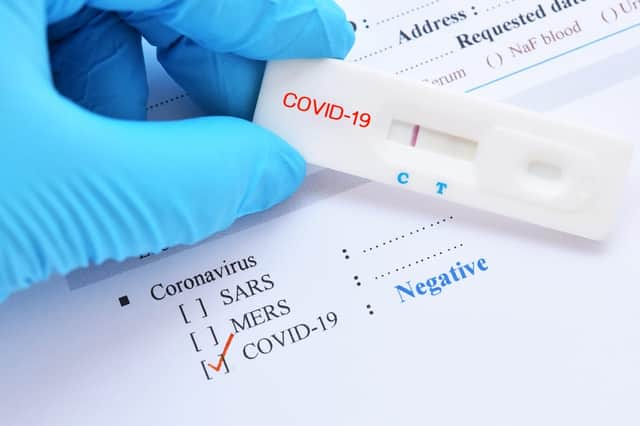A new coronavirus saliva test is being trialled in the UK - here’s how it works


Testing for coronavirus could be easier to undertake and yield more accurate results with a new saliva test.
A weekly coronavirus testing routine is being trialled using a ‘no-swab’ technique, which requires participants to spit into a sample pot to be tested for the virus.
This is everything you need to know.
How does the test work?
Advertisement
Hide AdAdvertisement
Hide AdThe ‘no swab’ test will work by having people spitting their saliva into a sample pot, which will then be tested for current infections of the virus.
Health and Social Care Secretary Matt Hancock said: “Saliva testing could potentially make it even easier for people to take coronavirus tests at home, without having to use swabs.
“The trial will also help us learn if routine, at home testing could pick up cases of the virus earlier.”
A statement from the Department of Health and Social Care (DHSC) explained that the new test will be “significant to increasing testing capacity and accessibility as it does not require the use of a swab”. It explained that some people found the swab test “uncomfortable”.
Advertisement
Hide AdAdvertisement
Hide AdThe sample would then be collected for testing to confirm whether or not someone has been infected with the coronavirus.
The DHSC said: “The test has already been shown to be highly promising and the pilot is undertaking further validation against polymerase chain reaction (PCR) nasal swabs.”
Currently people with suspected coronavirus have to go to a testing centre to have their nasal passages and back of their throat swabbed - or alternatively, they have to try and do this by themselves using a kit sent to their home.
There have been fears that the current method of testing could be producing false negatives, due to the difficulty of swabbing the sinuses and back of the throat.
Advertisement
Hide AdAdvertisement
Hide AdResearch from Bristol University and Johns Hopkins found that up to 20 per cent of swab tests return false negatives.
How will the trial work?
The new coronavirus saliva test is set to be trialled in Southampton, with GP staff, essential key workers, University of Southampton staff and members of their households to be amongst the first groups to be involved in the trial.
The test kits will be delivered to their homes or places of work and they’ll be required to complete the kit every week.
Weekly testing aims to help identify coronavirus cases easy on, including those with no or only minor symptoms.
Advertisement
Hide AdAdvertisement
Hide AdThe samples will be collected from the homes of participants by University of Southampton staff, or will be collected from an agreed location.
Those providing samples will then receive their test results within 48 hours.
When enrolling in the trial, participants were informed that their details would be shared with the NHS Test and Trace programme, so that contact tracing could begin immediately if there was a positive test.
Southampton City Council Director of Public Health, Debbie Chase, said: “We will initially invite Southampton’s 800 strong GP practice workforce and their households to take part, followed by some other essential key workers and some University of Southampton staff and students as we evaluate the logistics needed for regular testing of large population groups.”
Advertisement
Hide AdAdvertisement
Hide AdThe trial will run for up to four weeks, testing on a weekly basis, and is due to begin next week.
The schedule for the roll out of the trial goes as follows:
- Week two to four: initial GP staff and household members (200 test per week) for three weeks
- Week three to four: wider GP staff (2,300 test per week), some University of Southampton employees (10,000 tests per week) and some key workers at Southampton City Council (2,200 test per week) for two weeks, including their household members
- Week four: university students in halls of residence (about 1,300 tests)